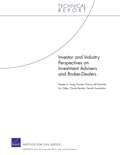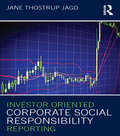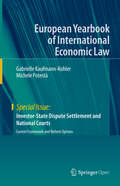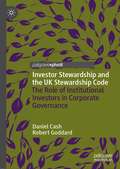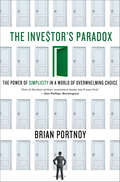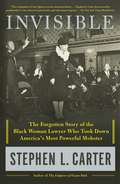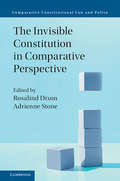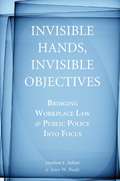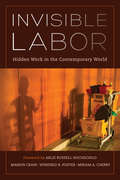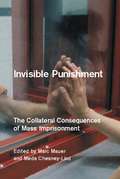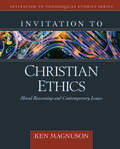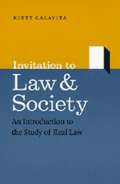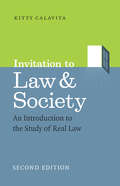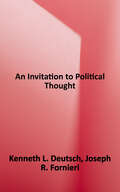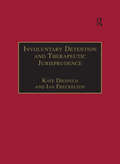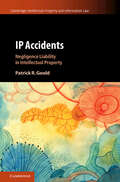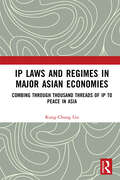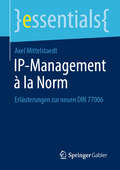- Table View
- List View
Investment Treaty Law and Climate Change
by Tomás Restrepo RodríguezThe book deals with the question whether the investment treaty law system could be harmonized with the climate change international legal framework and the climate interest that lies beyond. The answer to this research question is divided into three parts. The first examines the relevance of the climate change international legal framework in investment treaty disputes as a natural pre(logical)interpretative stage. The second focuses on the BIT’s content-interpretation, which is the orthodox approach to solve the fragmentation between the system of investment treaty law and the system of international climate change law. Finally, the third part tackles this fragmentation through a heterodox approach that is grounded in the direct application of climate change principles through law ascertainment. Apart from concluding that harmonization between investment treaty law and international climate change law is possible through the orthodox approach to the expropriation and the FET standards, as well as through the direct application of the climate change precautionary principle and the CBDRRC principle − heterodox approach, the book suggests that tribunals are expected soon to openly address climate change disputes in their rulings.
Investor and Industry Perspectives on Investment Advisers and Broker-Dealers
by Claude Berrebi Eric Talley Noreen Clancy Angela A. Hung Jeff DominitzIn theory, financial professionals are relatively distinct: A broker-dealer conducts transactions in securities on behalf of itself and others; and an investment adviser provides advice to others regarding securities. Different laws regulate each type of professional, but boundaries have blurred. This report examines current business practices and investor understanding of each type.
Investor Oriented Corporate Social Responsibility Reporting
by Jane Thostrup JagdReporting organizations' corporate social responsibility activities is difficult - a lack of regulation means that the communication of these activities varies significantly and there is a multitude of ways in which mistakes can be made. The author provides the tools and insights required to produce investor-friendly CSR reports and includes a chapter showing how the investors can integrate CSR in their quantified analysis of investment-opportunities. Features include formulas, conversion standards and CSR note tables which enable the book to be used as a practical handbook as well as in the classroom. Written by an experienced compliance officer with years of experience in reporting CSR, this book is an easy-to-follow guide for practitioners and students and will be required reading for students of accounting, financial reporting and auditing as well as those in industry who want to improve their organization's reporting standards.
Investor-State Dispute Settlement and National Courts: Current Framework and Reform Options (European Yearbook of International Economic Law)
by Gabrielle Kaufmann-Kohler Michele PotestàThis open access book examines the multiple intersections between national and international courts in the field of investment protection, and suggests possible modes for regulating future jurisdictional interactions between domestic courts and international tribunals. The current system of foreign investment protection consists of more than 3,000 international investment agreements (IIAs), most of which provide for investment arbitration as the forum for the resolution of disputes between foreign investors and host States. However, national courts also have jurisdiction over certain matters involving cross-border investments. International investment tribunals and national courts thus interact in a number of ways, which range from harmonious co-existence to reinforcing complementation, reciprocal supervision and, occasionally, competition and discord. The book maps this complex relationship between dispute settlement bodies in the current investment treaty context and assesses the potential role of domestic courts in future treaty frameworks that could emerge from the States’ current efforts to reform the system.The book concludes that, in certain areas of interaction between domestic courts and international investment tribunals, the “division of labor” between the two bodies is not always optimal, producing inefficiencies that burden the system as a whole. In these areas, there is a need for improvement by introducing a more fruitful allocation of tasks between domestic and international courts and tribunals – whatever form(s) the international mechanism for the settlement of investment disputes may take.Given its scope, the book contributes not only to legal analysis, but also to the policy reflections that are needed for ongoing efforts to reform investor-State dispute settlement.
Investor Stewardship and the UK Stewardship Code: The Role of Institutional Investors in Corporate Governance
by Daniel Cash Robert GoddardThis book provides a critical assessment of the development of the Stewardship Code 2020, which sets out principles regarding the role of institutional investors in corporate governance. It discusses how the regulatory framework for stewardship evolved before and after the financial crisis, and how that evolution resulted in the 2020 Code. It then critiques the Code from a practical and academic perspective, as well as evaluating the wider regulatory framework; in particular, the position of the FRC (ARGA). The book concludes by offering insight into different pathways that the evolution of stewardship may continue to take. Stewardship Codes modelled on the U.K.’s original 2010 version have been introduced in numerous markets and as such the book will be relevant for an international audience of academics, regulators and policymakers in financial regulation, investment regulation and financial services.
The Investor's Paradox: The Power of Simplicity in a World of Overwhelming Choice
by Brian PortnoyInvestors are in a jam. A troubled global economy, unpredictable markets, and a bewildering number of investment choices create a dangerous landscape for individual and institutional investors alike. To meet this challenge, most of us rely on a portfolio of fund managers to take risk on our behalves. Here, investment expert Brian Portnoy delivers a powerful framework for choosing the right ones – and avoiding the losers.Portnoy reveals that the right answers are found by confronting our own subconscious biases and behavioral quirks. A paradox we all face is the natural desire for more choice in our lives, yet the more we have, the less satisfied we become – whether we're at the grocery store, choosing doctors, or flipping through hundreds of TV channels. So, too, with investing, where there are literally tens of thousands of funds from which to choose. Hence "the investor's paradox": We crave abundant investment choices to conquer volatile markets, yet with greater flexibility, the more overwhelmed and less empowered we become.Leveraging the fresh insights of behavioral economics, Portnoy demystifies the opaque world of elite hedge funds, addresses the limits of mass market mutual funds, and discards the false dichotomy between "traditional" and "alternative" investments. He also explores why hedge funds have recently become such a controversial and disruptive force. Turns out it's not the splashy headlines – spectacular trades, newly minted billionaires, aggressive tactics – but something much more fundamental. The stratospheric rise to prominence and availability of alternative strategies represents a further explosion in the size and complexity of the choice set in a market already saturated with products. It constitutes something we all both crave and detest.The Investor's Paradox lights a path toward simplicity in a world of dangerous markets and overwhelming choice. Written in accessible, jargon-free language, with a healthy skepticism of today's money management industry, it offers not only practical tools for investment success but also a message of empowerment for investors drowning in possibility.
Invisible: The Forgotten Story of the Black Woman Lawyer Who Took Down America's Most Powerful Mobster
by Stephen L. CarterThe bestselling author delves into his past and discovers the inspiring story of his grandmother’s extraordinary life She was black and a woman and a prosecutor, a graduate of Smith College and the granddaughter of slaves, as dazzlingly unlikely a combination as one could imagine in New York of the 1930s—and without the strategy she devised, Lucky Luciano, the most powerful Mafia boss in history, would never have been convicted. When special prosecutor Thomas E. Dewey selected twenty lawyers to help him clean up the city’s underworld, she was the only member of his team who was not a white male.Eunice Hunton Carter, Stephen Carter’s grandmother, was raised in a world of stultifying expectations about race and gender, yet by the 1940s, her professional and political successes had made her one of the most famous black women in America. But her triumphs were shadowed by prejudice and tragedy. Greatly complicating her rise was her difficult relationship with her younger brother, Alphaeus, an avowed Communist who—together with his friend Dashiell Hammett—would go to prison during the McCarthy era. Yet she remained unbowed.Moving, haunting, and as fast-paced as a novel, Invisible tells the true story of a woman who often found her path blocked by the social and political expectations of her time. But Eunice Carter never accepted defeat, and thanks to her grandson’s remarkable book, her long forgotten story is once again visible.
Invisible: A Novel (Paul McGrath #1)
by Andrew GrantAn Army veteran and intelligence agent goes undercover as a janitor at a federal courthouse to pursue his own brand of justice in a thriller that’s part John Grisham, part Robert Crais.“Propulsive and engaging from the very first page.”—C. J. Box, #1 New York Times bestselling author of the Joe Pickett series As a young man, Paul McGrath rebelled against his pacifist father by becoming a standout Army recruit and the star of his military intelligence unit. But lingering regrets about their relationship make him return home, only to find his father dead, seemingly murdered. When the case ends in a mistrial—after a key piece of evidence disappears—something doesn’t smell right to McGrath. So he puts his arsenal of skills to work to find out just how corrupt the legal system is. And to keep digging, he gets a job at the courthouse. But not as a lawyer or a clerk. . . . Now McGrath is a janitor. The perfect cover, it gives him security clearance and access to the entire building. No one notices him, but he notices everyone. He notices when witnesses suddenly change their stories. When jury members reverse their votes during deliberation. When armies of corporate attorneys grind down their small-time adversaries with endless tactical shenanigans. While McGrath knows that nothing he discovers can undo his past wrongs or save his father, he finds his new calling brings him something else: the chance to right current wrongs and save others. And by doing so—just maybe—to redeem himself . . . if the powerful and corrupt don’t kill him first.Advance praise for Invisible “The masterful Andrew Grant outdoes himself with this deliciously twisty, magnetic thriller. Fiercely redemptive, with its clever, profoundly moving, and altogether captivating David and Goliath hook, Invisible is a winner.”—Sara Blaedel, #1 internationally bestselling author of The Forgotten Girls“Paul McGrath is not just a janitor—he’s a terrific new hero in what promises to be a fantastic and original series by Grant. Paul may be invisible . . . but his results are not in this intense mystery thriller that will leave you wanting more. In a word? Awesome.”—Allison Brennan, New York Times bestselling author of Too Far Gone“Invisible is a riveting read from cover to cover. I love getting in on the ground floor of a new series, especially when it’s sure to be a hit!”—John Gilstrap, New York Times bestselling author of the Jonathan Grave series
Invisible Atrocities: The Aesthetic Biases of International Criminal Justice
by Randle C. DeFalcoInternational criminal justice is, at its core, an anti-atrocity project. Yet just what an 'atrocity' is remains undefined and undertheorized. This book examines how associations between atrocity commission and the production of horrific spectacles shape the processes through which international crimes are identified and conceptualized, leading to the foregrounding of certain forms of mass violence and the backgrounding or complete invisibilization of others. In doing so, it identifies various, seemingly banal ways through which international crimes may be committed and demonstrates how the criminality of such forms of violence and abuse tends to be obfuscated. This book suggests that the failure to address these 'invisible atrocities' represents a major flaw in the current international criminal justice system, one that produces a host of problematic repercussions and undermines the legal legitimacy of international criminal law itself.
The Invisible Constitution in Comparative Perspective (Comparative Constitutional Law and Policy)
by Rosalind Dixon Adrienne StoneConstitutions worldwide inevitably have 'invisible' features: they have silences and lacunae, unwritten or conventional underpinnings, and social and political dimensions not apparent to certain observers. The Invisible Constitution in Comparative Perspective helps us understand these dimensions to contemporary constitutions, and their role in the interpretation, legitimacy and stability of different constitutional systems. This volume provides a nuanced theoretical discussion of the idea of 'invisibility' in a constitutional context, and its relationship to more traditional understandings of written versus unwritten constitutionalism. Containing a rich array of case studies, including discussions of constitutional practice in Australia, Canada, China, Germany, Hong Kong, Israel, Italy, Indonesia, Ireland and Malaysia, this book will look at how this aspect of 'invisible constitutions' is manifested across different jurisdictions.
Invisible Crimes and Social Harms
by Pamela Davies Peter Francis Tanya WyattThis unique collection explores the continuing invisibility of much crime and victimization, and the lack of adequate responses to them. Shaping the lens through which criminology and victimology is approached in the twenty-first century, the volume examines major issues including (in)justice, risks, rights, regulation and enforcement.
Invisible Hands, Invisible Objectives: Bringing Workplace Law and Public Policy into Focus
by John W. Budd Stephen F. BefortWritten for policymakers and scholars, this volume shows how the current global financial crisis affects free market ideologies, and how employment relationships in the United Sates need to be reworked in terms of regulations and economic efficiency. Befort (law, U. of Minnesota Law School) and Budd (management, U. of Minnesota) introduce a set of reforms that address regulatory enforcement, employee benefits, living wages, workplace safety and health, balanced income distributions and labor unions. The authors also emphasize the need for explicitness in all aspects of workplace law and public policy. Annotation ©2009 Book News, Inc. , Portland, OR (booknews. com)
Invisible Labor: Hidden Work in the Contemporary World
by Winifred Poster Marion Crain Miriam CherryAcross the world, workers labor without pay for the benefit of profitable businesses--and it's legal. Labor trends like outsourcing and technology hide some workers, and branding and employer mandates erase others. Invisible workers who remain under-protected by wage laws include retail workers who function as walking billboards and take payment in clothing discounts or prestige; waitstaff at "breastaurants" who conform their bodies to a business model; and inventory stockers at grocery stores who go hungry to complete their shifts. Invisible Labor gathers essays by prominent sociologists and legal scholars to illuminate how and why such labor has been hidden from view.
Invisible Punishment
by Meda Chesney-Lind Marc MauerIn a series of newly commissioned essays from the leading scholars and advocates in criminal justice, Invisible Punishment explores, for the first time, the far-reaching consequences of our current criminal justice policies. Adopted as part of "get tough on crime" attitudes that prevailed in the 1980s and '90s, a range of strategies, from "three strikes" and "a war on drugs," to mandatory sentencing and prison privatization, have resulted in the mass incarceration of American citizens, and have had enormous effects not just on wrong-doers, but on their families and the communities they come from. This book looks at the consequences of these policies twenty years later.
The Invisible Woman: Gender, Crime, and Justice (Fourth Edition) (Wadsworth Contemporary Issues in Crime and Justice)
by Joanne BelknapTHE INVISIBLE WOMAN: GENDER, CRIME, AND JUSTICE is the definitive guide on women and the criminal justice system, focusing on female offenders and their treatment by the criminal justice system, female victims of crime, and female employees of criminal justice system agencies. Thoroughly updated with new research and statistics, the fourth edition covers such timely and important topics as restorative justice, gender-responsive programming, sex trafficking, pathways research, Intimate Partner Abuse (IPA)/Domestic Violence (DV), and stalking.
Invitation to Christian Ethics: Moral Reasoning And Contemporary Issues (Invitation to Theological Studies)
by Ken MagnusonA comprehensive introduction to Christian ethics addressing today’s most challenging moral issuesInvitation to Christian Ethics is an indispensable guide for helping pastors, counselors, and everyday Christians navigate today’s difficult moral questions. Readers will benefit from Ken Magnuson’s survey of ethics from a biblical perspective as well as contemporary theories of moral reasoning. This survey is followed by twelve chapters devoted to some of the thorniest issues Christians encounter today, such as: • Sexuality, including homosexuality, sexual identity, and gender• Marriage and divorce• Infertility and assisted reproductive technologies• Abortion• Physician-assisted suicide• Race relations• Creation care• Capital punishment• Just war, pacifism, and the use of lethal forceMagnuson provides biblical insight into each topic and presents key moral considerations. He also answers specific, practical questions that arise and concludes with a summary of his recommended approach to each issue. Readers will learn how to grapple with difficult moral questions and will receive guidance for some of life’s most challenging ethical conundrums.
Invitation to Law and Society: An Introduction to the Study of Real Law
by Kitty CalavitaLaw and Society is a rapidly-growing interdisciplinary field that turns on its head the conventional, idealized view of the "Law" as a magisterial abstraction. Kitty Calavita's Invitation to Law and Society brilliantly brings to life the ways in which law shapes and manifests itself in the institutions and interactions of human society, while inviting the reader into conversations that introduce the field's dominant themes and most lively disagreements.Deftly interweaving scholarship with familiar personal examples, Calavita shows how scholars in the discipline are collectively engaged in a subversive exposé of law's public mythology. While surveying prominent issues and distinctive approaches to the use of the law in everyday life, as well as its potential as a tool for social change, this volume provides a view of law that is more real but just as compelling as its mythic counterpart. In a field of inquiry that has long lacked a sophisticated yet accessible introduction to its ways of thinking,Invitation to Law and Society will serve as an engaging and indispensable guide.
Invitation to Law and Society, Second Edition: An Introduction to the Study of Real Law (Chicago Series in Law and Society)
by Kitty CalavitaLaw and society is a rapidly growing field that turns the conventional view of law as mythical abstraction on its head. Kitty Calavita brilliantly brings to life the ways in which law is found not only in statutes and courtrooms but in our institutions and interactions, while inviting readers into conversations that introduce the field's dominant themes and most lively disagreements. Deftly interweaving scholarship with familiar examples, Calavita shows how scholars in the discipline are collectively engaged in a subversive exposé of law's public mythology. While surveying prominent issues and distinctive approaches to both law as it is written and actual legal practices, as well as the law's potential as a tool for social change, this volume provides a view of law that is more real but just as compelling as its mythic counterpart. With this second edition of Invitation to Law and Society, Calavita brings up to date what is arguably the leading introduction to this exciting, evolving field of inquiry and adds a new chapter on the growing law and cultural studies movement.
An Invitation to Political Thought
by Kenneth L. Deutsch Joseph R. FornieriAn Invitation to Political Thought is a student-friendly introductory text/reader for political theory that includes a guided explanation of western political thought from Plato to Nietzsche with accompanying primary sources. An Invitation to Political Thought thus saves the student money by uniquely combining both explanatory essays and primary sources in a single volume. Each chapter begins with an examination of the life of and legacy of an epic political thinker and then proceeds to unpack that thinker's core teaching on such enduring questions as human nature, state and society, justice, political obligation, war and peace, political education, gender and politics, rights and revolution. Other pedagogical features include case studies that relate the material to current events, questions for reflection, a list of key terms, a list of sources, and helpful websites for further reading.
Involuntary Detention and Therapeutic Jurisprudence: International Perspectives on Civil Commitment
by Kate DiesfeldInternational developments within the last twenty years have demonstrated controversial shifts in treatment for people with mental illnesses and the care of persons with intellectual disabilities. These shifts have been apparent in an emphasis on deinstitutionalization, increased scrutiny of detention and discharge decisions and, in some countries, in enforced treatment and care in the community. As we become increasingly conscious of the political and moral dimensions of civil commitment, these concerns are reflected in the professional literature, but this does not often enough focus on issues of clinical and legal principle, nor is it in a form which encourages comparative analysis. This collection draws on contributors from the UK, the USA, Australia, the Netherlands, Canada and New Zealand, who share a commitment to evaluating whether the civil detention processes protect the liberty, dignity and justice interests of those with mental illnesses and intellectual disabilities. The book is written from a therapeutic jurisprudence perspective and poses a number of questions with international application, such as: Are more categories of people being detained? Is involuntary detention serving new purposes? Are different forms of detention gaining credence and being more widely utilized? And, are admission decisions and review of detention decisions transparent, consistent, and just?
Iowa Driver's Manual
by Iowa Department of TransportationThis manual will provide you the information needed for a general understanding of the principles of safe and lawful operation of a motor vehicle. However, it is NOT intended to serve as a precise statement of Iowa statutes concerning the operation of a motor vehicle and should not be considered as such.
IP Accidents: Negligence Liability in Intellectual Property (Cambridge Intellectual Property and Information Law #59)
by Patrick R. GooldIn the twenty-first century, it has become easy to break IP law accidentally. The challenges presented by orphan works, independent invention or IP trolls are merely examples of a much more fundamental problem: IP accidents. This book argues that IP law ought to govern accidental infringement much like tort law governs other types of accidents. In particular, the accidental infringer ought to be liable in IP law only when their conduct was negligent. The current strict liability approach to IP infringement was appropriate in the nineteenth century, when IP accidents were far less frequent. But in the Information Age, where accidents are increasingly common, efficiency, equity, and fairness support the reform of IP to a negligence regime. Patrick R. Goold provides the most coherent explanation of how property and tort interact within the field of IP, contributing to a clearer understanding of property and tort law and private law generally.
IP Laws and Regimes in Major Asian Economies: Combing through Thousand Threads of IP to Peace in Asia
by Kung-Chung LiuThis book systematically studies the structural characteristics of IP laws and regimes of major Asian economies, including (but not always) China, Hong Kong, India, Indonesia, Japan, Korea, Malaysia, Singapore, Taiwan, and Thailand. It explores and crystallizes some worthy Asian models which could further help the development of international IP laws. This book begins with an overview of Asian modern history and IP laws. It discusses the three basic IP laws in Asia which are patent law, trademark law and copyright law. It looks at the pre-established damages for copyright infringement and trademark counterfeiting. The book also deals with problems with trade secret and its over-protection. It compares IP laws and four industries in India and China, and examines what role have IP laws played in the development in those industries and how India and China can learn from each other. Finally, it examines one medium and one small-sized Asian economy on its respective struggle (Taiwan’s efforts to build a coherent IP exhaustion regime) and a success story (how Singapore has utilized IP to secure its position in global value chains). This book is a useful reference for law students, scholars, practitioners, IP professionals who are interested in knowing Asia, Asian IP laws and industries, their struggles and finding ways to better global IP laws. The case studies could provide helpful lessons for other Asian economies and beyond.
IP-Management à la Norm: Erläuterungen zur neuen DIN 77006 (essentials)
by Axel MittelstaedtDas essential führt in die Aufgabenstellung eines qualitätsvollen Managements des geistigen Eigentums (engl. Intellectual Property = IP) ein und gibt Anregungen für die Nutzung der Norm. IP ist ein wesentlicher Bestandteil des Unternehmensvermögens. Sein Wert nimmt nicht nur in der Wahrnehmung Interessierter zu. Er übersteigt häufig den des Sach- und Finanzvermögens. Das Bedürfnis nach einem qualitätsvollen Management von IP (IPM) nimmt seit der Jahrhundertwende deutlich zu. Das war Grund für das Deutsche Institut für Normung (DIN), die DIN-Norm 77006 über Anforderungen an Qualität im IPM zu schaffen. Diese Norm ist kürzlich veröffentlicht worden. Sie ist sowohl Aufstellung der Anforderungen an ein qualitätsvolles IPM als auch Leitfaden für Aufbau und Handhabung eines solchen IPM.
iPad Apps In One Hour for Lawyers
by Tom MighellFinding the best apps often can be an overwhelming, confusing, and frustrating process. iPad Apps in One Hour for Lawyers provides the "best of the best" apps that are essential for any law practice. In just one hour, you will learn about the apps most worthy of your time and attention. This book will describe how to buy, install, and update iPad apps

